This year 129 airlines made the list.
Others are reading now
Airline security is a fundamental aspect of modern travel, shaping both passenger trust and industry standards.
For governments and aviation authorities, maintaining safety requires constant vigilance, strict regulations, and international cooperation.
The European Union (EU) has long taken a proactive role in monitoring airline operations to ensure compliance with safety protocols.
Also read
Banned From Flying in EU
The European Commission recently released its updated EU Air Safety List, which names airlines banned from operating in EU airspace due to safety concerns.
This year, 129 airlines made the list, including 100 from 15 countries where authorities fail to adequately supervise aviation safety.
These airlines are restricted from flying within the EU or flagged for travelers as high-risk carriers, according to 20Minutos.
The list includes 22 airlines from Russia, such as Aeroflot, Rossiya Airlines, and Pobeda Airlines, which were cited for significant safety deficiencies.
Seven other carriers from countries like Venezuela (Avior Airlines), Suriname (Blue Wing Airlines), and Zimbabwe (Air Zimbabwe) were also flagged.
A notable addition this year is Air Tanzania, which was blacklisted for its inadequate safety measures.
On a positive note, the update marked the removal of two Pakistani airlines, Pakistan International Airlines and Airblue Limited, which have been banned since 2020.
Their inclusion on the list followed concerns about pilot certification and safety practices. Having addressed these issues, they are now permitted to resume operations in Europe starting in January.
The EU Air Safety List not only enforces safety within its borders but also serves as a global warning system for travelers flying outside the EU.
It alerts passengers to carriers with poor safety records, promoting informed travel choices and encouraging international airlines to improve their safety standards.


